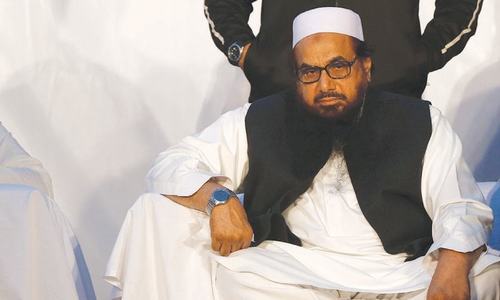Defence Minister Khurram Dastagir on Wednesday rejected the notion that Pakistan has acted against Jamaatud Dawa chief Hafiz Saeed due to pressure from the United States, saying that all action against the JuD falls under the ambit of Operation Raddul Fasaad.
Dastagir, in an interview with BBC Urdu, said that although a number of organisations have been banned internationally, Pakistan would assess the situation and take steps accordingly.
"Action against JuD is being carried out in light of a well thought out strategy for a safer Pakistan where terrorists are never able to gun down school children ever again," Dastagir said during the interview.
"It is not that we will take up arms against our own country — that time has passed," he said, adding that Pakistan will now make calculated decision.
The minister said that the Pakistan we see today is a post-Operation Zarb-i-Azb Pakistan. "The country we see today came to be after countless sacrifices made by citizens, soldiers and officers of the Pakistan Army," he added.
Discussing the recent rifts between Pakistan and the US, the minister for defence termed Trump's tweet as a "point of view".
"Instead of learning counter-terrorism from Pakistan, the US is cursing us," he said.
He added that there had been positive dialogue between Pakistan and the US in the past few months but the relationship was given "a negative colour on the public level".
Dastagir also accused India of playing an "indirect role" in the deteriorating relationship between Pakistan and the US.
The defence minister's statements come a day after Washington confirmed suspension of $255 million in military aid to Pakistan.
Military aid to Islamabad was cut after Trump, in a tweet, accused Pakistan of of being a liar.
The tweet had come in the aftermath of an increasingly terse back-and-forth between Washington and Islamabad since Trump announced his administration's latest national security strategy.
Earlier, the US also called Pakistan out for the release of JuD leader Hafiz Saeed, describing it as a "step in the wrong direction" and had said a refusal to re-arrest him would damage bilateral ties and Pakistan's reputation around the world.













































